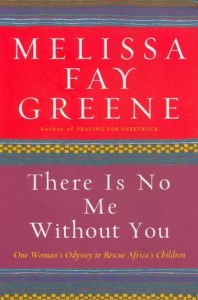 A few months back I was on the hunt for books that would help broaden my mind and help educate me in the cultures and experiences of others across the world, so I jumped at the chance to read Melissa Fay Greene’s ‘There is no me without you’. Straight away from the first few pages I knew that it would be a difficult read, that it would cause an impact on my way of thinking and force me to think about certain things in a lot more detail. It’s also the type of book that spurs you into action, it angers you, it terrifies you and it breaks your heart, point being it makes you “feel”.
A few months back I was on the hunt for books that would help broaden my mind and help educate me in the cultures and experiences of others across the world, so I jumped at the chance to read Melissa Fay Greene’s ‘There is no me without you’. Straight away from the first few pages I knew that it would be a difficult read, that it would cause an impact on my way of thinking and force me to think about certain things in a lot more detail. It’s also the type of book that spurs you into action, it angers you, it terrifies you and it breaks your heart, point being it makes you “feel”.
The book is a true account of the life of Haregewoin Teferra, an amazing Ethiopian woman, who, after losing her daughter, starts to take in the orphans of Addis Ababa, many of whom were children with aids. The book describes Haregewoin’s journey and the problems she encounters as a carer for children with aids.
We hear about the children, so many orphaned children, who have no family, no way of feeding themselves, they’ve watched their relatives die around them, many losing all hope of any life that doesn’t include pain, fear and hunger. We hear first hand of children being brought to Haregewoin, many by their own extended family who do not want the burden of a child left behind by the ravages of aids.
Haregewoin Teferra is one of those selfless women who makes the choice to follow her own heart even when she knows that she may be disowned by her friends and neighbours for her actions.
As harrowing as the book is, there is also joy that comes from the people who come to adopt the orphans, who provide them with a family, love and a life that would not have been possible if not for the initial actions of Haregewoin.
What Amazon wrote – There Is No Me Without You is the story of Haregewoin Tefarra, a middle-aged Ethiopian woman of modest means whose home has become a refuge for hundreds of children orphaned by AIDS. It is a story as much about the power of the bond between children and parents as about the epidemic that every year leaves millions of children, mostly healthy themselves, without family. Originally a middle-class woman with a happy family life, Haregewoin fell into a deep depression after the death of her recently married daughter. But then a priest brought her two children, AIDS orphans, with nowhere to go. Unexpectedly, the children thrived, and Haregewoin found herself drawn back into daily life. As word got out, an endless stream of children began to arrive at her door, delivered by dying parents and other relatives who begged for her help, and, pushing against the limits of her home and bank account, she took more and more in. Today, Haregewoin runs a school, a daycare system, and a shelter for sick mothers. Without medication for her charges–some HIV-positive, some uninfected, and some infants trying to fight off the virus, but almost all of whom come to her terrified and malnourished–she forges on, caring for as many as she can handle. Increasingly, she also places them for adoption with families like that of journalist Melissa Fay Greene, who has two children adopted from Ethiopia. In Haregewoin Tefarra’s story, Greene gives us an astonishing portrait of a woman fighting a continent-wide epidemic.
Like most people, I read the book and the first thing I did was find a way to help, so we found that ActionAid was a tremendous site that made sponsoring a child an easy process and we are now sponsoring a wonderful little girl, Zowda from Somaliland. We hope to sponsor many more children and keep trying to help in as many ways as we can. But if it hadn’t been for reading this book, we may never have had the gumption to get out there and start helping.